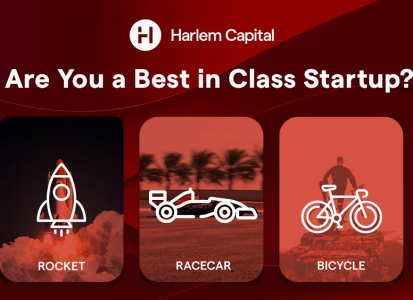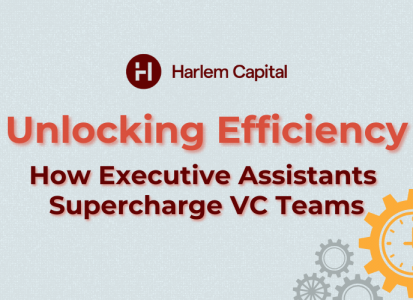Navigating, Entering, and Thriving in VC
by Harlem Capital
Lessons from 6 Venture Capitalists of Color, Across the U.S.

For budding venture capitalists, trying to break into the venture capital industry is hard. And, for VCs of color, this might seem impossible as less than 2% of VCs are Black, less than 1% are Latinx, and even fewer are Black or Latinx women. [2016 Deloitte and the NVCA study]. These statistics may make a career in VC seem dismal for aspiring VCs of color, especially those of us like Jomayra Herrera, who are charting uncharted paths as the first in our families and communities to enter this space. However, it is not impossible.
After speaking with six Black and Latinx VCs who are changing the face of entrepreneurship and venture capital, we distilled five valuable lessons for anyone trying to successfully break into the industry. These young leaders hail from all over the U.S. and engage in exciting work with companies across sectors and stages. They have given us more than a taste of what it is like to do what they do; they have provided us with actionable lessons for how anyone can navigate, enter, and thrive in VC as we continue changing its landscape.
Check out these five lessons!
- You Don’t Know What You Don’t Know
- Have An Opinion and SHARE IT — Generally and During Interviews
- Follow Your Interests — It Will Lead You and Help You Track Trends
- Act Like You’re Already in VC
- Be Patient and Don’t Give Up
Lesson 1: You Don’t Know What You Don’t Know
Venture capital, like countless industries, has unique nuances to successfully navigate — lingo, skills, exposure, hiring structure, and more. So, for anyone trying to enter VC, it is not fruitful to seek generic advice by saying, “hey, tell me what I need to know because I don’t know what I don’t know.” Instead, seek personalized exposure, guidance and support if you want to successfully enter and thrive in VC. Be reflective about your strengths and weaknesses are, what you want to do, what you want to gain, and where you want to be.
After you reflect, try these steps to learn what you don’t know.
- Seek sponsors. As Stefanie put it, “access to sponsorship, to a network or group of people who are going to provide things beyond money to entrepreneurs [and to budding VCs] is priceless.”
- Network in a smart way. Go to networking events, reach out for coffees, phone chats, etc.; and, heed Jillian’s advice: “make sure you [network] in a smart way. I think cold outreach gets a really bad name because a lot of people do not reach out effectively. Do your diligence on who you are contacting. For example, find a partner at a fund who writes a lot or is focused on a space you’re interested in. Reach out with a tailored message about how you’re thinking about this space to elicit a better response.”
- Don’t ask people to be your mentor. For Aaron, this has been helpful. “Identify people you look up to and don’t necessarily ask them to be your mentor. Instead, understand from them what they did to become valuable entrepreneurs and investors and apply it to what you’re doing.”
- Be Valuable. Whether you intern or work with a VC firm, startup, or company, Aaron emphasized, “make [yourself] valuable to entrepreneurs. When I became interested in consumer behavior and enabling consumer-facing companies, I didn’t know the depths of this industry. So, to learn more, I reached out to a recently-launched startup and did a bunch of meetings for them on the consumer landscape. This exposure was invaluable to developing and strengthening my skills.”
Regardless of your approach, remember this wise wisdom from Jillian: “VCs are busy. So, before you reach out, evaluate the following:
- How much value are either of you getting; and,
- Do you have a clear ask and the ability to follow up — if the VC says to circle back in two weeks, can you remember to circle back?”
Failing to properly assess these two points can be “crucial mistakes.”
Lesson 2: Have An Opinion and SHARE IT — Generally and During Interviews
Generally
If you know a lot about a topic, write about it, talk about it, share it. Why?
“VCs will learn your interests and how you think. This will help you form and strengthen personal, valuable relationships, making you more valuable than someone who has shallow relationships across the board.” — Jomayra
Even if you don’t know the most, “share and come from a place of learning,” adds Aaron. He shares two examples:
- I asked the Twitter community for help in creating a space for and list of ‘Black Men in Venture.’ This got the attention of Culture Shifting. They notified me that this space existed and invited me to their annual summit.
- Another time, I started a thread about influencers in the space. People dunked on me. But, it got me relevant; and, now we have a context point for more discussion. Instead of being discouraged, I learned to continue sharing. I recommend the same for anyone trying to enter VC.
How do you do this?
- Use social media. Think Tweets and Twitter threads. This is THE current mode of communication in VC. If you want to be in VC → BE ACTIVE ON TWITTER. Post, use hashtags, comment, Retweet with comments.
- Start a Newsletter. Aaron did this. “It’s an engaging conversation; just write it, share it online, and investors will pick it up. VCs hear from me monthly with something valuable. It is all about carving your own angle.”
- Blog. “Find something you think is interesting and innovative. Try to find your thesis and iterate off of that,” shares Jillian. “Sharing your thoughts and learning from other people in the space is a great asset. And, you get your name out there. Do it early; I think most VCs will find it helpful! I try to write a post a quarter. Sometimes I highlight trends or problems I see with recommendations or potential solutions to show my thinking.”
During Interviews
Speak to a few things you know well. Don’t just list companies.
“Everyone has their own style for sharing their opinion and interviewing; but, across the board, it tends to be very conversational, focused on what themes and companies you see. It is more about you speaking to a few things really well rather than listing companies that you don’t have a strong grasp on.” — Solomon
Remember, disagreements are healthy in VC. Why? “Because everyone does not see the same problem in the same light. So, these discussions are incredibly important. This is why, in venture broadly, there needs to be more diversity. It is incredibly healthy [for there to be disagreement]. You have to remove the ‘personal’ from your thesis. If someone disagrees, it just means that person does not believe in your idea, not in you, as a person.” — Solomon
Lesson 3: Follow Your Interests — It Will Lead You and Help You Track Trends
Following your interests and trends can be as broad as impact “for the culture,” or can be more industry or sector specific, such as Education and FinTech. Whatever it is, follow it, track it, and share your opinion. Check out two investors who did just that!
From Global Banking to VC
“Following what I really care about, I landed on Venture Capital because I started to see the power in and ability for innovation to change markets, neighborhoods, and communities. I wondered, ‘what could this look like if the industry was more diverse, with more Black and brown folks doing this in [Silicon] Valley. Would we have new found wealth and power?’” — Stefanie
- For Stephanie, following her interest for how social impact meets entrepreneurship enabled Stefanie to better understand and track the trends surrounding the economic inequalities in VC, which led her to co-founded Quarterback Impact while also managing fund development for an impact investment evergreen project prior to joining Impact America Fund. It was also the impetus behind her “6,000 mile road trip to work with entrepreneurs across the US which deepened [her] involvement in building more inclusive entrepreneurial ecosystems and amplifying the economic imperative for venture investment in overlooked markets.”
From Education to VC
“Witnessing the stark inequalities that permeate generations of students of color across the country sparked my passion for education. The urgency to reduce barriers to educational opportunities was so clear to me that I decided to pursue a Master’s in Education instead of a law degree.” — Jomayra
- For Jomayra, focusing on her interests gives her “time to think about these areas, research companies, and meet other people who are thinking about or working in this space. This often means I can be more prepared to diligence companies that fall into those areas and see more deal flow related to these things. Also, once you make an investment, you can actually be more helpful because your network tends to concentrate within these areas.” Her passion also led her to work in EdTech, at a startup, and now investing, at Cowboy Ventures, as she has fallen in love with investing more broadly, while still holding on to her passions in education and the future of work.
Lesson 4: Act Like You’re Already in VC
Completing, or at least starting on, Lessons 2 and 3 will help prepare you to act like a VC. Jillian and Chris agree that, while this may sound weird, a good thing to try to do is act like you’re already in VC! Here are some ways how:
- “Start or work for a VC fund with your school. This will help you put your investment thesis to work as you source companies, conduct due diligence, write investment memos and make investments.” — Chris
- “Consult for startups. Working with an early-stage company’s CEO to add value shows initiative and gets you involved in the community.” — Chris
- “Attend tech meetups and get to know your local founders” — Jillian
- “Build a thoughtful online presence with a thesis and opinion is really important. Leading with that can be helpful and creative.” — Chris
Regardless of your approach, Chris reminds us that “it is all about thinking outside the box, about ways you can differentiate your candidacy.”
Lesson 5: Be Patient and Don’t Give Up
Navigating the venture capital industry — trying to enter the space, move up in the ranks and thrive — can be difficult. It takes people with the most competitive resume and pedigree background over a year to secure a job, partly because there are a limited number of positions. So, what should you keep in mind?
- “Venture is a very long game; and, a lot of times, there is no immediacy between applying and getting the job.” — Aaron.
- Be proactive. Get in the pipeline. “Venture managers have the benefit of hiring from their network. So, you need to be more proactive instead of waiting for a job posting to come up. A lot of times, there is already a pipeline. So, the name of the game is to be as proactive as possible. And, this is a big part of the job — think sourcing companies: the best deals are done when you can make the case as to why the founder should take money from your fund instead of someone else’s.” — Solomon
- Stay true to you. “We are so underrepresented. So, I don’t have to look like a ‘traditional VC.’ And, for anyone coming into this space, don’t put that pressure on yourself. Show up as you are, true to who you are and what you believe in. That’s how you’ll find your value add and approach to investing. Putting a stake in the ground as something that is part of your truth and what you really have conviction about is powerful. Take up as much space as possible and be unapologetic about it.” — Stefanie
- “Believe in yourself. You will send a lot of emails and get a lot of ‘nos.’ Just keep telling yourself that it will work out. Keep iterating! Every ‘no’ is an opportunity to learn. Ask for feedback and keep working on yourself, adding new skills sets and finding your value add.” — Chris
Conclusion
Engage. Add value. Differentiate your candidacy. Don’t quit.
Thank you to the investors in this article:
- Stefanie Thomas, Impact America Fund (Washington, DC);
- Solomon Hailu, Tusk Ventures (NY, NY);
- Jomayra Herrera, Cowboy Ventures (SF, CA);
- Aaron McClendon, Detroit Venture Partners (Detroit, MI);
- Jillian Williams, Anthemis Group (NY, NY); and,
- Chris Wallace, Greycroft (NY,NY).
And, a special thank you Donna Scaffidi, our Winter 2020 intern, for doing these interviews and this write-up.
To stay up-to-date on Harlem Capital news, subscribe to our monthly newsletter.


